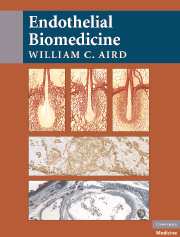Book contents
- Frontmatter
- Contents
- Editor, Associate Editors, Artistic Consultant, and Contributors
- Preface
- PART I CONTEXT
- 1 The Endothelium in History
- 2 Introductory Essay: Evolution, Comparative Biology, and Development
- 3 Evolution of Cardiovascular Systems and Their Endothelial Linings
- 4 The Evolution and Comparative Biology of Vascular Development and the Endothelium
- 5 Fish Endothelium
- 6 Hagfish: A Model for Early Endothelium
- 7 The Unusual Cardiovascular System of the Hemoglobinless Antarctic Icefish
- 8 The Fish Endocardium: A Review on the Teleost Heart
- 9 Skin Breathing in Amphibians
- 10 Avian Endothelium
- 11 Spontaneous Cardiovascular and Endothelial Disorders in Dogs and Cats
- 12 Giraffe Cardiovascular Adaptations to Gravity
- 13 Energy Turnover and Oxygen Transport in the Smallest Mammal: The Etruscan Shrew
- 14 Molecular Phylogeny
- 15 Darwinian Medicine: What Evolutionary Medicine Offers to Endothelium Researchers
- 16 The Ancestral Biomedical Environment
- 17 Putting Up Resistance: Maternal–Fetal Conflict over the Control of Uteroplacental Blood Flow
- 18 Xenopus as a Model to Study Endothelial Development and Modulation
- 19 Vascular Development in Zebrafish
- 20 Endothelial Cell Differentiation and Vascular Development in Mammals
- 21 Fate Mapping
- 22 Pancreas and Liver: Mutual Signaling during Vascularized Tissue Formation
- 23 Pulmonary Vascular Development
- 24 Shall I Compare the Endothelium to a Summer's Day: The Role of Metaphor in Communicating Science
- 25 The Membrane Metaphor: Urban Design and the Endothelium
- 26 Computer Metaphors for the Endothelium
- PART II ENDOTHELIAL CELL AS INPUT-OUTPUT DEVICE
- PART III VASCULAR BED/ORGAN STRUCTURE AND FUNCTION IN HEALTH AND DISEASE
- PART IV DIAGNOSIS AND TREATMENT
- PART V CHALLENGES AND OPPORTUNITIES
- Index
- Plate section
15 - Darwinian Medicine: What Evolutionary Medicine Offers to Endothelium Researchers
from PART I - CONTEXT
Published online by Cambridge University Press: 04 May 2010
- Frontmatter
- Contents
- Editor, Associate Editors, Artistic Consultant, and Contributors
- Preface
- PART I CONTEXT
- 1 The Endothelium in History
- 2 Introductory Essay: Evolution, Comparative Biology, and Development
- 3 Evolution of Cardiovascular Systems and Their Endothelial Linings
- 4 The Evolution and Comparative Biology of Vascular Development and the Endothelium
- 5 Fish Endothelium
- 6 Hagfish: A Model for Early Endothelium
- 7 The Unusual Cardiovascular System of the Hemoglobinless Antarctic Icefish
- 8 The Fish Endocardium: A Review on the Teleost Heart
- 9 Skin Breathing in Amphibians
- 10 Avian Endothelium
- 11 Spontaneous Cardiovascular and Endothelial Disorders in Dogs and Cats
- 12 Giraffe Cardiovascular Adaptations to Gravity
- 13 Energy Turnover and Oxygen Transport in the Smallest Mammal: The Etruscan Shrew
- 14 Molecular Phylogeny
- 15 Darwinian Medicine: What Evolutionary Medicine Offers to Endothelium Researchers
- 16 The Ancestral Biomedical Environment
- 17 Putting Up Resistance: Maternal–Fetal Conflict over the Control of Uteroplacental Blood Flow
- 18 Xenopus as a Model to Study Endothelial Development and Modulation
- 19 Vascular Development in Zebrafish
- 20 Endothelial Cell Differentiation and Vascular Development in Mammals
- 21 Fate Mapping
- 22 Pancreas and Liver: Mutual Signaling during Vascularized Tissue Formation
- 23 Pulmonary Vascular Development
- 24 Shall I Compare the Endothelium to a Summer's Day: The Role of Metaphor in Communicating Science
- 25 The Membrane Metaphor: Urban Design and the Endothelium
- 26 Computer Metaphors for the Endothelium
- PART II ENDOTHELIAL CELL AS INPUT-OUTPUT DEVICE
- PART III VASCULAR BED/ORGAN STRUCTURE AND FUNCTION IN HEALTH AND DISEASE
- PART IV DIAGNOSIS AND TREATMENT
- PART V CHALLENGES AND OPPORTUNITIES
- Index
- Plate section
Summary
Almost all our detailed knowledge about the endothelium is proximate knowledge about its structure, development, and functioning, and how its dysfunctions lead to disease. The other, evolutionary half of endothelial biology has been neglected. Some researchers are unfamiliar with the fundamental distinction between proximate and evolutionary questions, and methods for formulating and testing evolutionary hypotheses about the endothelium remain underappreciated. This chapter offers a brief overview of the distinction between evolutionary and proximate explanations, followed by an introduction to evolutionary medicine and its applications to the endothelium.
Evolutionary, or Darwinian, medicine simply brings the power of evolutionary biology to bear on the problems of medicine. Some areas, such as pathogen evolution and population genetics, are well developed. Another aspect, emphasized in Darwinian medicine, is the enterprise of formulating and testing hypotheses about why natural selection has not shaped bodies that are more resistant to disease. The six key reasons for traits that leave bodies vulnerable to disease are reviewed below. Each is illustrated with examples from general medicine, and then with examples from a major disease of the endothelium, atherosclerosis.
TWO SEPARATE BIOLOGICAL QUESTIONS
Ernst Mayr passed away early in 2005 at age 100, shortly after publishing his twentieth book and the last of his 700+ scientific articles. One of his enduring contributions was his dogged emphasis on the importance of distinguishing proximate from evolutionary (sometimes called ultimate) biological explanations. His treatise, The Growth of Biological Thought, traces these two only-occasionally intersecting threads in biology: one that studies how things work (proximate), the other that studies why organisms are the way they are (evolutionary) (1). His final book, What Makes Biology Unique, continues and updates the theme (2).
- Type
- Chapter
- Information
- Endothelial Biomedicine , pp. 122 - 128Publisher: Cambridge University PressPrint publication year: 2007
- 4
- Cited by



